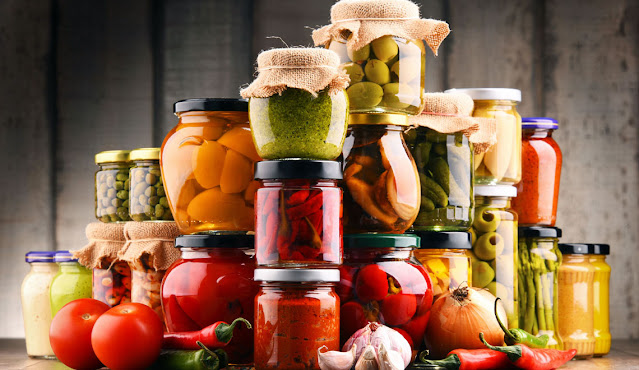Preservatives Help Keep the Food Products Fresh for Longer and Extend Its Shelf Life
 |
| Preservatives |
Preservatives are chemicals or substances
added to food products, beverages, drugs, cosmetics, paints, and wood to
prevent microbial growth and unwanted changes in terms of both chemical and
physical properties. Along with emulsifying and stabilizing agents,
preservatives also help to maintain freshness of appearance and consistency.
Preservatives are of two kinds, such as natural and synthetic, both are used to
enhance the quality of the end product. Natural once are naturally derived
additives used in a wide range of products.
Natural Preservatives
also help preserve natural characteristics of food and increase the shelf life
of food products for storage. Artificial or synthetic preservatives are added
to food, sprayed on the outside of food, or added to certain medications to
slow down discoloration, spoilage, or contamination by bacteria and other
disease organisms. Some of the most popular are sorbic acid, sodium benzoate,
butylated hydroxytoluene (BHT), & butylated hydroxyanisole (BHA). Thus,
there is an increasing demand for both natural and synthetic preservatives.
Preservatives, in food, are added to fight
spoilage caused by yeast, fungus, molds, and bacteria. They help keep the food
fresh for longer periods, extending its shelf life. Food preservatives are also
used to slow or prevent changes in flavor, color, or texture of food and delay
rancidity. Calcium Propionate is considered as the best food improver and food
preservative which is generally produced by Calcium Hydroxide and Propionic
Acid. It inhibits the growth of mold and other bacteria while increasing the
shelf life of bakery foods.
Natural preservatives, such as vitamin E,
antioxidants, seed extracts, and rosemary extracts, are readily available in
nature and often obtained from plant sources. Synthetic preservatives such as
potassium sorbate, sulfur dioxide, sodium nitrite, and benzoic acid are
chemical components processed and added to the end product. Preserved foods
have nutritional value intact but are still harmful to the health in the long
term. Thus, in the U.S., preservatives are regulated by the Food and Drug
Administration (FDA) and the Environmental Protection Agency (EPA).



Comments
Post a Comment